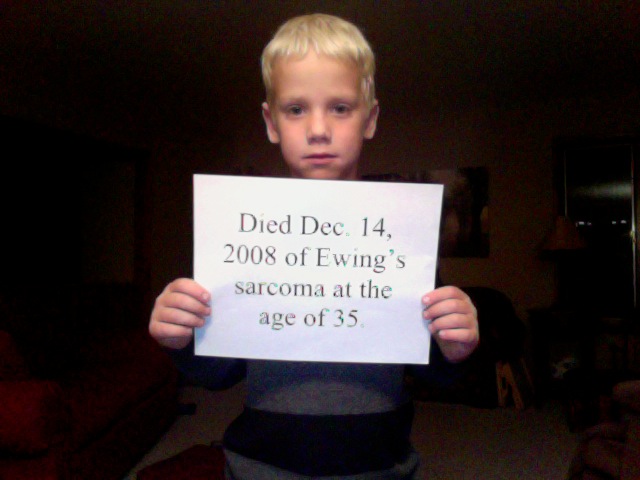Guest blog post by Polly Schlaff
Polly writes a blog at www.reclaimingourfuture.com. Here is how she describes her blog: “I am the single mother of three young boys and a widow. In December of 2008, I lost my 35-year-old husband, Doug, to cancer. Before Doug’s diagnosis, I assumed that safeguards were in place to protect my family from known toxins.
Following Doug’s death, I learned that more than 80,000 chemicals are produced and marketed in the U.S. with virtually no regulation, exposing American families daily without their permission or knowledge to numerous toxins that have the ability to devastate their health and their futures.” She wrote this post as a call to Senators on November 17th the day Safe Chemicals Act legislative hearing.
Senators, Please Protect our Families
The sun warmed the small porch of our rental home, the day my husband, Doug, became a cancer patient. Seated in a flimsy plastic chair, long thin legs stretched out before him, he grasped the armrests steadying the fresh incision that ran from sternum to pelvis. Our twin preschool sons crowded his lap while their brother bounced nearby on pudgy toddler legs.
I leaned against the porch railing, my mouth quivering with a smile while I watched my mother-in-law remove the clippers from their case. Silently, I pleaded with Doug for a smirk, but his full lips were neutral and his green eyes disinterested as with a flip of the switch, the electric razor began to buzz. “Oh boy, here we go! Who’s next?” I called to our sons. They giggled and thumped their bare feet on the porch floor, pumping arms and legs up and down, as the razor cut long pink paths through blonde hair that would never grow back.
At age 35, Doug died of Ewing’s sarcoma.
Ewing’s is a rare disease with no known genetic link, a fact both reassuring and troubling to a single mother bent on protecting her children from illness. No genetic flaw predisposes my sons to Ewing’s sarcoma, yet every day they, along with millions of other American children, are exposed to known and suspected carcinogens.Toxic chemicals are ubiquitous in our homes, schools and communities, and numerous studies confirm the presence of hundreds of synthetic chemicals in our bodies. Chemicals in the umbilical cord blood that flows freely between mother and child insure that every baby is born pre-polluted, and when a mother chooses to breastfeed she passes to her child (along with many healthful benefits) a toxic heritage (Jenkins 44-45). 
Today, November 17th, the Safe Chemicals Act will come before the Senate Environment and Public Works Committee in a private hearing, and our leaders in Washington will decide whether the health of our families deserves their attention. Historically efforts to reduce cancer have paid little attention to environmental contaminants, choosing instead to focus on lifestyle and genetics. Yet these factors alone cannot account for all cancers.
They cannot explain the steady increase in childhood cancers, a trend that continues despite the fact that, as author Sandra Steingraber notes, “young children do not smoke, drink alcohol or hold stressful jobs” (Steingraber 45). Neither can genetics and lifestyle fully explain why American daughters and sons assume a far greater risk than their parents do for developing cancer in their lifetimes, nor account for the rapid rates of increase in cancers closely associated with prolonged exposures to synthetic chemicals, such as non-Hodgkin’s lymphoma (Steingraber 53).
Perhaps the reason cancer prevention campaigns focus so little on reducing our exposure to toxic chemicals is because we are woefully unequipped to do so. Reliable safety information on the products that line store shelves is virtually non-existent as are labels indicating which chemicals are used in any given product. Proprietary laws do not require companies to disclose this information, and to make matters worse safeguards simply do not exist.
In 1976, Congress established the Toxic Substances Control Act (TSCA), an act that has failed miserably in achieving its goal of protecting Americans from harmful chemicals. Under this ineffective legislation, U.S. companies have produced over 80,000 chemicals; the Environmental Protection Agency (EPA) has tested 200, and regulated a mere five. Today, nearly all synthetic chemicals – even known and suspected carcinogens – are manufactured and marketed in the U.S. with no regulation (President’s Cancer Panel 20-22)
In the absence of regulation should we trust chemical companies with public health or simply leave the job of protecting families from toxic chemicals to tired moms and dads? The Safe Chemicals Act, introduced this April, provides a better alternative. This proposed act would require chemical companies to submit information on the health risks of their products, information that could then be used by the EPA to prioritize chemicals based on risk and to reduce those of highest concern while requiring further testing for those of uncertain risk. Europe has passed similar legislation. In fact, many companies are already producing two versions of their products, the traditional one for the U.S. and a safer alternative for Europe (Jenkins 219).
In the past, companies have argued that regulation would result in closed plants and lost jobs, and well-paid lobbyists representing the chemical industry have persuaded legislators of the same; however, a number of companies have proven that social responsibility and good business can co-exist. By producing safer products they have reduced their risk of liability and the costs associated with the storage and disposal of hazardous materials, finding that attention to customer safety improves consumer confidence and increases their competitiveness in the global economy (Safer States).
Having paid the financial, emotional, physical and social costs of cancer, as lab rats in a grotesque national experiment, it is time for Americans to demand that the experiment be run in reverse, that toxic chemicals be removed from our environment and that success be measured by the health of our loved ones. Instead of waiting for mounting evidence on the damaging effects of synthetic chemicals on American families, let’s urge our legislators to support the Safe Chemicals Act and reduce the toxic chemicals in our homes and our bodies.
You can read more about Polly and her family in her featured Share your Story article from 2010.



